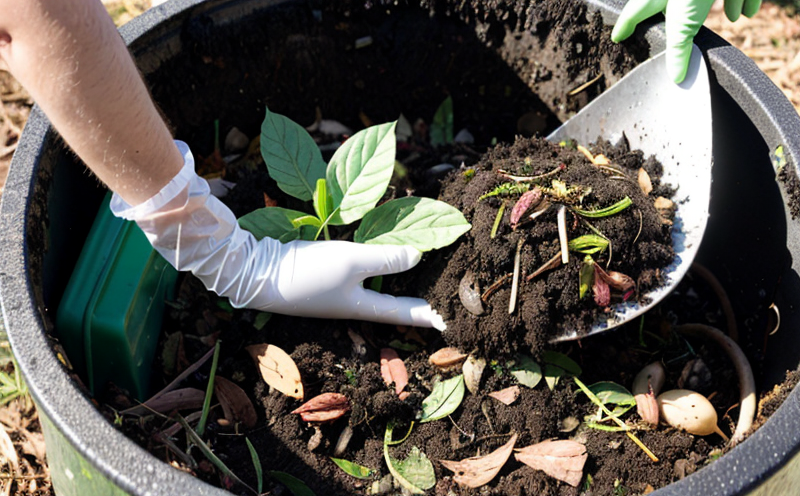EN 13697 Antimicrobial Efficacy Testing in Compost Systems
The European standard EN 13697 specifies a method to determine the antimicrobial efficacy of materials and products intended for use in composting systems. This testing is crucial for ensuring that substances, such as biodegradable packaging or agricultural additives, do not adversely affect microorganisms during decomposition processes.
Composting involves complex biological interactions where various microbes break down organic matter into simpler compounds like carbon dioxide and water. The presence of antimicrobial agents can potentially disrupt these natural processes by inhibiting microbial growth. Therefore, it is vital to assess their impact on composting efficiency and environmental sustainability before commercial use or release into the environment.
Our laboratory adheres strictly to EN 13697 guidelines when performing this service. We employ advanced analytical techniques to measure the residual antimicrobial activity after exposure to typical compost conditions over specified periods. This includes monitoring changes in microbial populations, pH levels, and other relevant parameters that indicate overall compost health.
For accurate results, our team prepares test specimens according to precise protocols outlined by EN 13697. Specimens are incubated under controlled environmental conditions mimicking real-world composting scenarios. Our state-of-the-art equipment allows us to track minute variations in microbial activity with high precision.
The outcome of these tests provides valuable insights into how different materials interact within compost systems, helping developers optimize product designs for better ecological compatibility. Compliance with this standard is essential for manufacturers aiming to produce sustainable products that meet stringent environmental regulations across Europe.
Our services extend beyond just performing EN 13697 tests; we also offer comprehensive advice on selecting appropriate antimicrobial agents and designing effective treatments suitable for composting applications. By leveraging our expertise in both microbiology and waste management, we ensure clients achieve their sustainability goals while maintaining product quality.
Applied Standards
| Antimicrobial Efficacy Testing Method | Standard Number | Description |
|---|---|---|
| EN 13697:2004(European Standard) | European Committee for Standardization (CEN) | Determines the antimicrobial efficacy of materials and products intended for use in composting systems. |
The EN 13697 standard provides detailed instructions on preparing test specimens, conducting trials under specified conditions, and analyzing results to determine whether a given material has adverse effects on microbial activity during composting. Compliance with this standard ensures that products used in compost systems are safe for the environment.
Quality and Reliability Assurance
We maintain strict quality control measures throughout every stage of our EN 13697 antimicrobial efficacy testing process to ensure reliable results. Our laboratories are equipped with cutting-edge technology and certified by relevant authorities, ensuring that all tests meet international standards.
Our team comprises highly skilled microbiologists and waste management experts who possess extensive knowledge in handling diverse materials used in compost systems. Regular calibration of instruments guarantees accurate measurements, while rigorous quality checks during specimen preparation and testing prevent errors from affecting final outcomes.
The reliability of our services is further enhanced through continuous training for staff members and periodic audits by external bodies to verify adherence to best practices. Clients can trust that their samples will be handled with utmost care and precision, leading to credible findings they can rely upon when making informed decisions about product development or regulatory compliance.
Environmental and Sustainability Contributions
Testing antimicrobial efficacy in compost systems not only benefits individual companies but also contributes significantly to broader environmental goals. By ensuring that products do not negatively impact microbial communities during decomposition, we support healthier ecosystems where natural processes can proceed unhindered.
Incorporating sustainable practices into product design helps reduce waste and promote recycling efforts. For instance, by selecting antimicrobial agents that pose minimal risks when introduced to compost heaps, manufacturers contribute positively towards creating closed-loop cycles within the circular economy framework.
Our services play a critical role in fostering innovation among businesses operating within this sector. With increasing pressure from consumers and governments alike to adopt greener practices, companies need reliable data to substantiate their claims regarding environmental friendliness. By adhering to EN 13697 standards, we empower them to make scientifically backed decisions that enhance both economic performance and ecological responsibility.





